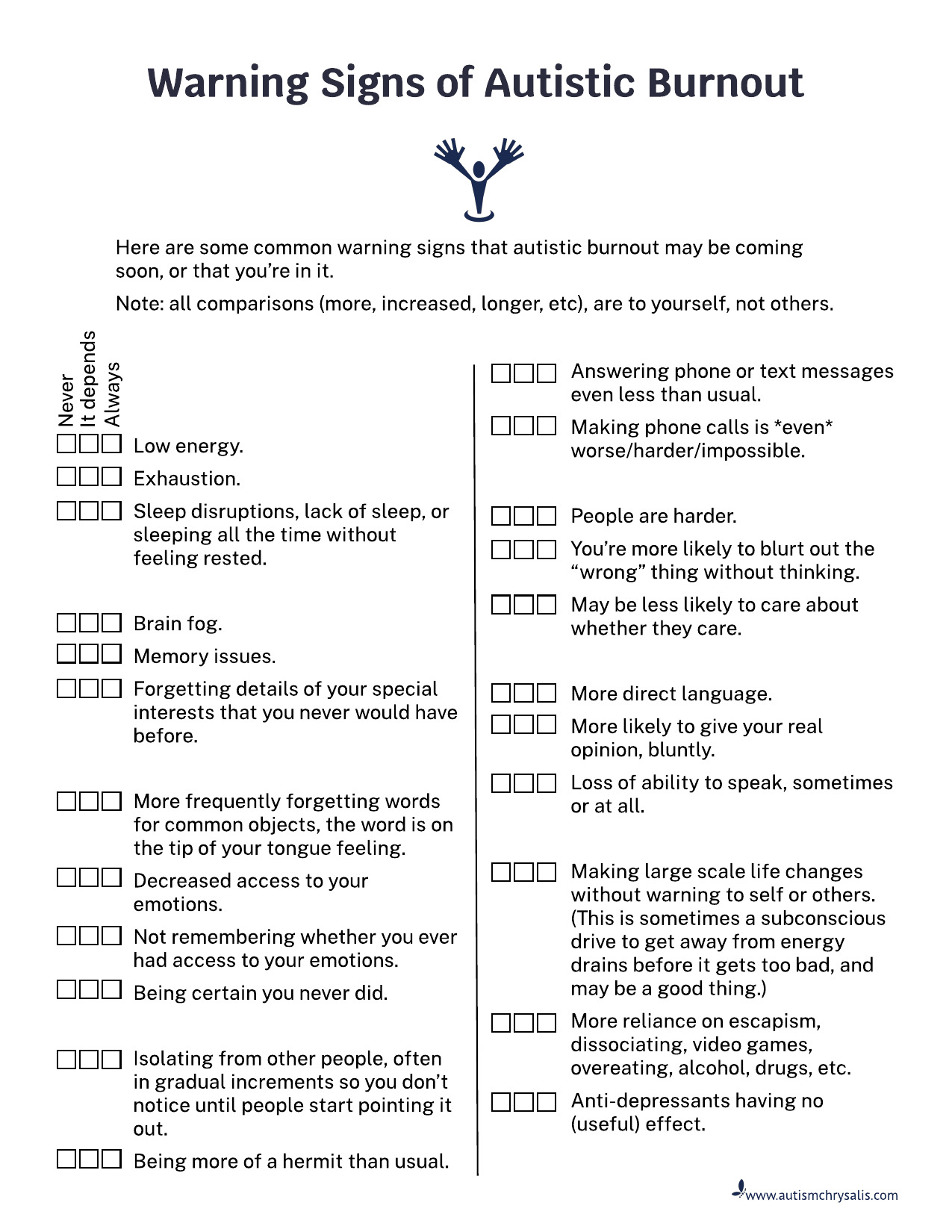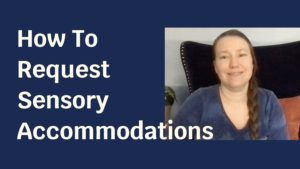
Common warning signs
Here are some common warning signs that autistic burnout coming soon, or that you’re in it.
This list came about because someone on Twitter asked me about warning signs in reply to my tweet about autistic burnout, and I couldn’t stop thinking of answers. A lot of this I personally experienced during my two major and other minor burnouts, and some are experiences common to my clients and other autistics I know or read. (Here’s this same list on Twitter.)
If several of these resonate with you, you might consider that what you’re experiencing may be autistic burnout. Keep in mind though, that while someone may experience many of them, probably no one will experience all of them. So if some do not apply to you, that doesn’t rule out burnout.
One last note. Whenever I use the language of comparisons (more, increased, longer, etc), your own personal best functional time in life is meant as the baseline. This is NOT a comparison to others, this is in comparison to you alone.
Downloadable checklist:


This is NOT a comparison to others, this is in comparison to you alone.
Now the list:
In no particular order:
Low energy.
Exhaustion.
Sleep disruptions, lack of sleep, or sleeping all the time without feeling rested.
Getting sick easily.
Taking longer than usual to recover.
Decreased motor control or coordination, especially for detailed tasks.
Dropping or bumping into things more frequently.
Minor, or major, injuries or accidents.
A feeling that you “have to” do things.
Increased black and white thinking, all or nothing thinking.
Getting frustrated more easily, at more things.
Increased negativity.
A sense that the world is going to pot.
You become the toxic person that people start to avoid or complain about.
(I want to comment on this one briefly. What I don’t mean is that you’re more direct and irritable than usual. That can damage relationships, but it’s not the same thing as toxic. But sometimes when we have no energy left to give, and no energy to care about others, and when we don’t have other, better ways to get our needs met, we can resort to excessive, controlling manipulation, hurting, and abuse to try to protect ourselves.)
Okay, back to the list:
A track record of accomplishments without feeling good about them.
Not being satisfied with all you have done.
You’re worried it’ll never be enough.
A strong drive to keep going even when you don’t have energy, eventually turning into not caring whether you keep going or not.
A strong, visceral, negative reaction to any suggestion to take it easy, relax, do self-care, take time off.
Decreased access to your emotions.
Not remembering whether you ever had access to your emotions.
Being certain you never did.
It’s harder to tell when you are tired, sleepy, hungry, full, etc.
It’s harder to tell whether you really want to be on Twitter, gaming, sleeping, or whether you’re doing things out of habit.
Having less access to what your body feels in general.
Sensory sensitivities get more intense, worse, harder to deal with, more frustrating.
It is harder to believe that they’ll ever get better.
Overwhelm is always a breath away.
Or nothing feels stimulating enough to be satisfying.
Meltdowns or shutdowns are always imminent.
Brain fog.
Memory issues.
Forgetting details of your special interests that you never would have before.
More frequently forgetting words for common objects, the word is on the tip of your tongue feeling.
Decreased facial recognition.
More reliance on escapism, dissociating, video games, overeating, alcohol, drugs, etc.
Getting on peoples cases about what they do or say, how they act around you.
Arguing more with people, online or IRL, who disagree with you.
Less tolerance for people having different opinions.
The conviction that if people just did what you said, it would be so much better.
Trying harder than ever to control other people.
Isolating from other people, often in gradual increments so you don’t notice until people start pointing it out.
Being more of a hermit than usual.
Answering phone or text messages even less than usual.
The more people get on your case to do things, the less you are able to do.
The more you try to do things, the more problems there are and the less well they turn out.
More and more people suggest that you need help, whether or not you believe them or want it.
You’ve probably tried many things over the years that haven’t helped, and are more convinced than ever that nothing will ever work.
Keeping your living space clean or tidy is becoming a bigger and bigger problem.
Small tasks feel huge.
Every little thing seems like a gigantic undertaking.
Decreased executive function.
More reliance on routines. Disruptions cause more stress.
More problems at work.
Losing work.
Trying a job and not managing.
Even part time may be too much.
Or not being able to stop working, ever, even when others suggest you should.
People are harder.
You’re more likely to blurt out the “wrong” thing without thinking.
May be less likely to care about whether they care.
More direct language.
More likely to give your real opinion, bluntly.
Loss of ability to speak, sometimes or at all.
It gets harder, and then impossible, to mask.
Any existing chronic illnesses get worse, flare up, or have increased pain.
Some people make large scale life changes without any warning to themselves or others. (This is sometimes a subconscious drive to get away from energy drains before it gets too bad, and may be a good thing.)
A feeling that the world would be better off without you.
That you’re just a drain on resources.
That you’re not adding anything good to the world.
That it’ll never get better.
Suicidal thoughts, with or without an intention to act.
A feeling of hitting a wall.
Everything feels harder.
Making phone calls is *even* worse/harder/impossible.
Panic attacks.
Increased anxiety.
Anti-depressants having no (useful) effect.
Common misdiagnoses include:
- Bipolar
- Depression
- Adrenal fatigue
- Laziness
- Selfishness
- A worsening of other pre-existing conditions
- “It’s only in your head.”
- PTSD or CPTSD
Nevertheless it is ALWAYS worthwhile to check with a doctor to rule out a medical explanation, as the above symptoms can also be signs of your body struggling to cope with physical or mental health challenges.
If these resonated a little too much with you, and you’d like some strategies and support getting out of autistic burnout, from someone who’s been there and done that, and has managed to systematize it for the neurodivergent brain, I’ve put together a course that does exactly that, and you can get more info here.
I hope this has been useful for you.
And I wish you a neurowonderful day.





4 Responses
So helpful
That’s a good list for a very bad condition, experience, trip – whatever you want to call it. I really wish they had chosen another word because “burnout” is often applied to just getting tired and fed up with something and this condition is far more debilitating than that.
The one that struck me was regarding making sudden major life changes which may be a good thing because we are escaping from something deadly. Been there, done that. When I read that statement in the list I realized how often I had done that! I’m convinced that there is a mind within our minds that is bound and determined to make us SURVIVE whether we want to or not It’s not concerned about future success or neurotypical decision-making paradigms, just “getting rid of X is a requisite for your survival and you ARE going to survive NOW, whether you like it or not.” I wonder if it is possible to understand the way our brains go on autopilot and tame that feature enough to bring it under the control of logic/ wisdom without falling victim to its impulses?
Do you think most autistics sense when a “burnout” is imminent? I knew early this spring that I was in deep water and, sure enough, in August my old friend swam by like a Great White, jaws and all. And, finally, do other autistics experience any kind of seasonality to burnouts? Since I was 12 years old I have dreaded August.
Thanks for making your knowledge and experience available. It is very helpful!
I experienced seasonal burnouts at the end of every school year when I was in school. My body held it together until school was out and then, bam, I was down for a while.
I can’t speak to whether it’s a common experience to know that they are coming, but looking back I always had a sense that something was not OK, and that I couldn’t keep pushing, but I also couldn’t stop. Now things are different, but it’s taken a lot of work to get to this point.
Yes, it is possible! (And it is sooo easy to focus on the negative).